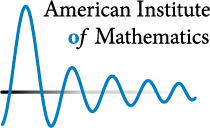
at the
American Institute of Mathematics, Palo Alto, California
organized by
Alexander Koldobsky, Dmitry Ryabogin, Vladyslav Yaskin, and Artem Zvavitch
This workshop, sponsored by AIM and the NSF, will be devoted to the study of geometric properties of convex bodies based on information about sections of these bodies. Results in this direction have important applications to many areas of mathematics and science. A new approach to sections and projections of convex bodies, based on methods of Fourier analysis, has recently been developed. The idea is to express geometric characteristics of a body in terms of the Fourier transform and then use methods of harmonic analysis to solve geometric problems. This approach has led to several results including Fourier analytic solutions of the Busemann-Petty and Shephard problems, characterizations of intersection and projection bodies, extremal sections and projections of certain classes of bodies. The most recent results include solutions of several longstanding uniqueness problems, and the discovery of stability in volume comparison problems and its connection to hyperplane inequalities.
We propose to bring together leading experts in the area and young researchers to discuss further development of the Fourier approach to sections of convex bodies, with focus on uniqueness problems, stability and hyperplane inequalities. We are going to start by collecting results and open problems on determination of convex bodies by volumes of certain classes of hyperplane sections. In the cases where convex bodies are uniquely determined by this data, we ask the corresponding volume comparison problem, namely if volumes of all sections from a certain class are smaller for one body than for another, is it true that the volume of the first body is also smaller. If the answer to a volume comparison problem is affirmative, we ask a stronger stability question and, if possible, apply stability to derive hyperplane inequalities in the spirit of the Hyperplane Conjecture, one of the most important open problems in convex geometry.
The workshop will differ from typical conferences in some regards. Participants will be invited to suggest open problems and questions before the workshop begins, and these will be posted on the workshop website. These include specific problems on which there is hope of making some progress during the workshop, as well as more ambitious problems which may influence the future activity of the field. Lectures at the workshop will be focused on familiarizing the participants with the background material leading up to specific problems, and the schedule will include discussion and parallel working sessions.
The deadline to apply for support to participate in this workshop has passed.
For more information email workshops@aimath.org
Plain text announcement or brief announcement.
Go to the
American Institute of Mathematics.
Go to the
list of upcoming workshops.